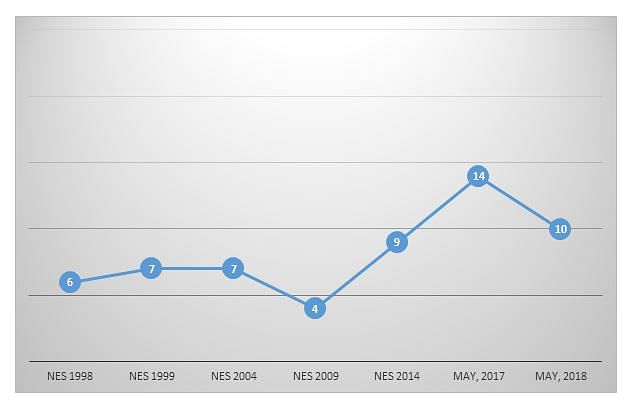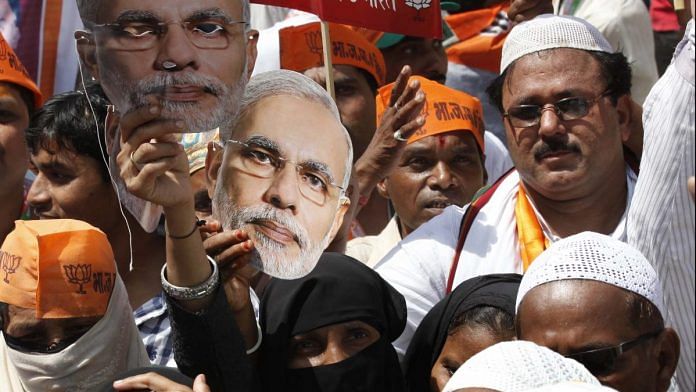More Muslims now support the BJP than they did in the last decade.
That the Bharatiya Janata Party has a Muslim problem is well-acknowledged. It was no surprise then that even the party’s detractors were puzzled by Prime Minister Narendra Modi’s decision to visit Saifee Mosque in Indore last week where he addressed a gathering of the Bohra Muslim community.
And as if this was not enough, speaking at a three-day conclave organised by the Rashtriya Swayamsevak Sangh (RSS) in New Delhi earlier this week, RSS chief Mohan Bhagwat said “Hindutva” means inclusivity and accepting Muslims is a part of it. “Hindu Rashtra doesn’t mean there’s no place for Muslims. If we don’t accept Muslims, it’s not Hindutva.”
Also read: PM website calls period of mourning ‘Ashara’ as ‘Ashara Mubarak’ & Shias are not happy
The symbolism and speeches by Modi and Bhagwat at these two events provided sufficient ammunition for a war of words in TV studios and on social media platforms between the supporters and their detractors of RSS and Bharatiya Janata Party (BJP). For the critics, these events were nothing more than a symbolic gesture, electoral posturing and empty-talk. But the BJP-RSS sympathisers pointed out that the BJP won the 2014 elections without the Muslims voting in large numbers for the party and thus there was no need for Modi and Bhagwat to do an election posturing to woo Muslim. In their view, while this may not lead to a change in the BJP’s core ideological position, it was rather a genuine reach effort to reach out.
The truth, as always, often lies closer to the middle. While the Muslims are among the least likely supporters of the BJP, it would be important to note that the party received one in every 10 votes from the Muslim community in 2014. The data presented in Figure 1 shows that the BJP’s support base among the Muslim community has increased in comparison to the last decade.
Muslim vote for the BJP (in %)

Note: The NES data is post-poll surveys and May 2017 and May 2018 data from MoTN surveys which record voting intention.
Also read: Mohan Bhagwat says no Hindu Rashtra without Muslims-Is RSS changing before 2019 polls?
This stabilisation in Muslim support for the BJP has happened despite the fact that barring few rare examples, the party seldom nominates Muslim candidates to contest elections or appoints them at important party positions or allocates noteworthy ministries to them even at the state level.
This has also happened despite nearly 80 per cent of the Muslim respondents in the Mood of the Nation (MoTN) Survey conducted by Lokniti-CSDS in May 2018 saying that they were dissatisfied with Modi government’s attitude towards atrocities, crimes and violence against their community.
Who then are the Muslim voters of the BJP? The analysis of the National Election Study (NES) 2014 and MoTN 2017 data suggests that the Muslim support for the BJP has certain discernible patterns – Shia, economically well-off, better educational qualification, women, young, religious, and slightly more opposed to inter-caste and inter-religious marriage.
We analysed the 2017 data more closely and found that 22 per cent of the BJP’s Muslim voters are Shia, compared to 17 per cent for other political parties. The BJP’s Muslim voters are economically better off than Muslim voters of other parties. The BJP’s Muslim voters are more educated with 55 per cent of them having studied up to Class 10 and above. For other parties, this figure stands at 50 per cent.
Also read: The Muslims voting for the BJP are richer, more educated and conservative
Interestingly, Muslim women are more likely to vote for the BJP. Women constitute about 56 per cent of the BJP’s Muslim support base, while men account for only 44 per cent. While many commentators have argued that the support among Muslim women for the BJP is due to the party’s stand on the triple talaq issue, the evidence to support such a claim is weak. However, those who oppose the tradition of triple talaq are clearly more likely to vote for the BJP.
Similarly, 52 per cent of the BJP’s Muslim voters are under 35 years of age as against 46 per cent who voted for other parties.
The BJP’s Muslim voters are more religious in their outlook: they are more likely to pray, attend religious gatherings, observe fasts and visit mosques. They are also more likely to oppose inter-caste and inter-religious marriage. While 55 and 68 per cent Muslim respondents who voted for other parties said inter-caste and inter-religious marriage is unacceptable, the proportion among the BJP’s Muslim voters was 62 and 73 per cent respectively.
What can be the driving factor for these Muslims to vote for the BJP? First, while it may be a bit early to argue, the data suggests that the aspirational classes among the Muslims are more likely to vote for the BJP. Second, Shias, according to some estimates, constitute one-sixth of India’s Muslim population and they are more likely to be concentrated in states where the BJP receives a sizeable fraction of its Muslim votes.
Muslim support for the BJP in various states

In 2014, the BJP won a substantial portion of Muslim votes in Gujarat, Rajasthan and Karnataka. It secured a moderate degree of support (national average of Muslim vote share for BJP) in Chhattisgarh, Jharkhand, Madhya Pradesh, Maharashtra and Uttar Pradesh.
Will the BJP manage to continue winning support among Muslims? What message could be drawn from Modi and Bhagwat’s speeches: is it a mere pre-election posturing or there is more to it than meets the eye? If it was merely political posturing, then it wouldn’t do much to expand the party’s footprint within the community.
Also read: What explains the Muslim silence in the face of BJP’s aggressive Hindutva?
However, if it is part of a serious outreach strategy, then this is the welcome first step. But it is just the first step. The party and the government will have to do much more to win the confidence of the community. Prime Minister Modi has the political capital to undertake this project because continuing with the systematic exclusion of a community, which numbers nearly 150 million, would result in nothing less than a social catastrophe.
Rahul Verma is a PhD candidate in Political Science at the University of California, Berkeley. Shashwat Dhar is a PhD student in Political Science at Vanderbilt University, Nashville.




A facet many of us were not aware of. Strengthens the case to send out a firm message that there should be no violence against the minorities, including verbal abuse. A more harmonious social atmosphere improves the prospects for securing coalition allies. It also helps Indian diplomacy.